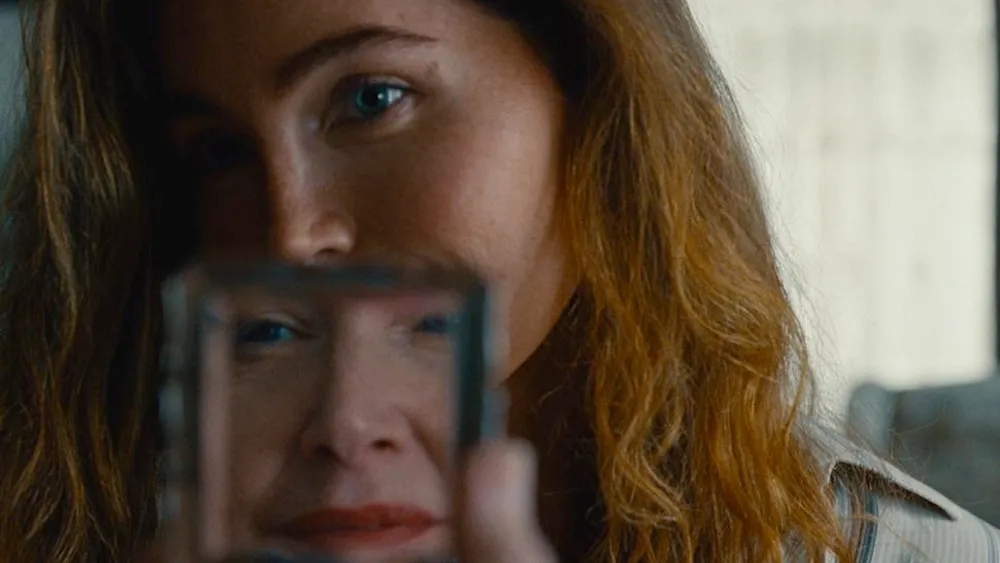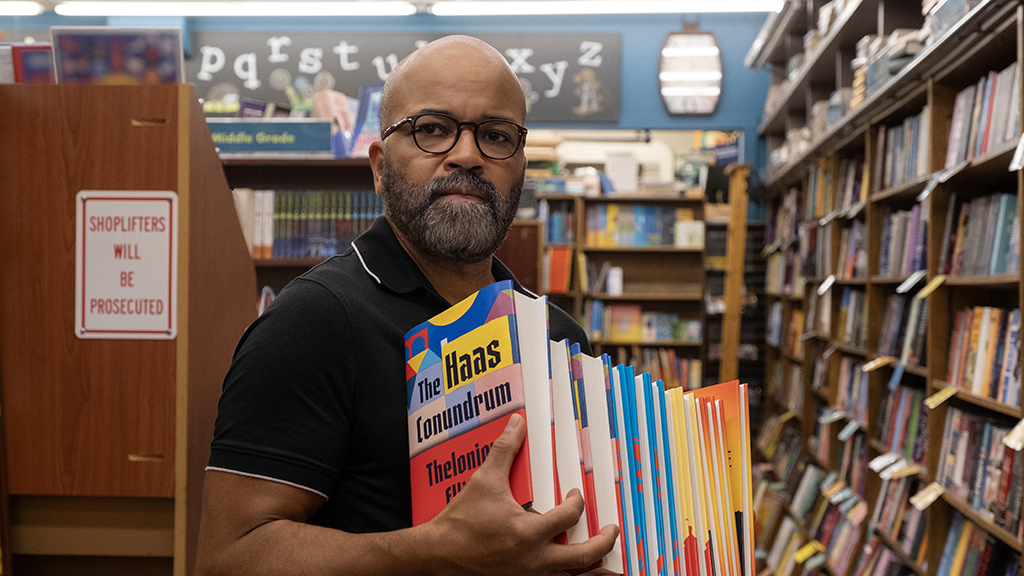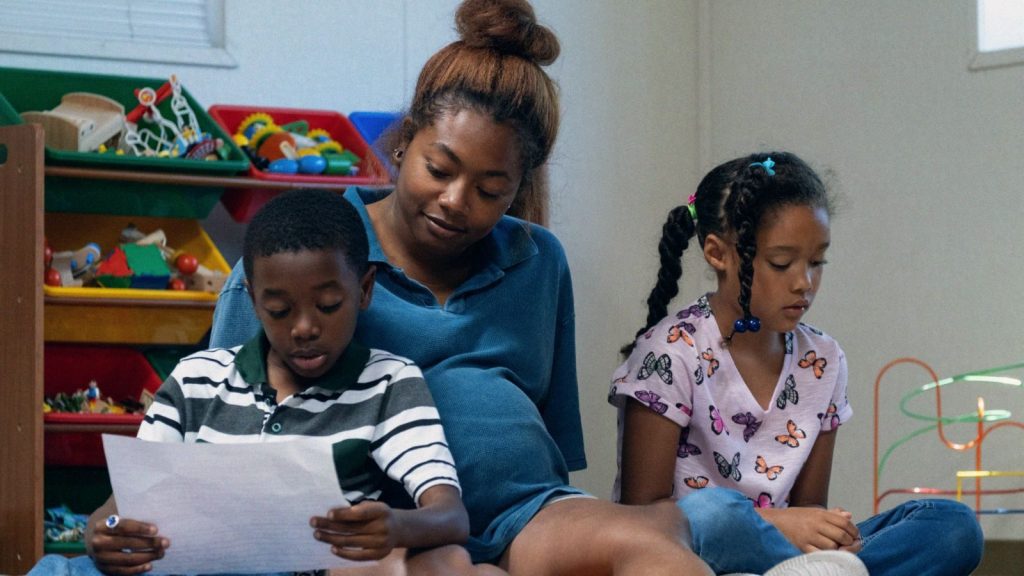10. Monica:

Monica (Trace Lysette) is a trans woman who after years of being away, apprehensively travels back to her hometown to visit her estranged dying mother (Patricia Clarkson). When a Hollywood movie focuses on a marginalized group, more often than not there are large aspects of the story which are sensationalized and exploitative. But thankfully this story was not made for the cisgender gaze. Not bogged down by exposition, we are asked to gather information through nuanced interactions Monica has with the world around her, her sister-in-law, her brother, their children and her mother who may recognize Monica but refuse to acknowledge Monica for who she truly is. Amidst the reality we live in of a violent and ever-present nationwide (worldwide) anti-trans movement, co-writer/director Andrea Pallaoro and writer Orlando Tirado make a conscious decision to present this trans story as a piece of slice of life realism. It’s a decision which pays off. Trace Lysette, who is on screen for every second of this film, intimately portrays a woman who carries with her the trauma of a tragic situation that is all too common in regards to LGBTQ+ youth. A queer child who is kicked out of the house at a young age; rejected by their own family and loved ones. Now grown and asked to interact with those who’ve ostracized her, Lysette is tasked with giving a performance that is not only personal, but also representative of so many who share very similar stories. And Lysette more than comes through with a powerhouse and award worthy performance. The direction focuses on Monica’s existence; her routines, her mannerisms, her body, her job, her anxiety, her motivations, her hopes and dreams, her joy and pain, and the isolation felt by someone alienated from family. Monica is a triumph of trans storytelling. It’s a somber movie about attempted reconciliation and forgiveness in a situation where neither may be an option. It’s a movie which shows the results of parental abandonment. And above all things, it’s a movie dedicated to spending time with a woman who is trans, as she moves through this world.
9. John Wick: Chapter 4:

It always struck me as funny that an entire action movie franchise could be built around a man with visibly bad knees. While I’ve liked all of the John Wick movies well enough, I was never into them as much as everyone else was. This final chapter changed all of that. We meet up with John Wick as he attempts to earn his freedom once again, and in doing so must face off against the most ruthless enemy yet. This may sound somewhat routine, but shockingly John Wick: Chapter 4 is not only the best of the bunch, but one of the best action movies I’ve ever seen. Director Chad Stahelski has been at the helm for all four of these and in this final chapter we get to witness him perfect his craft before our very eyes. Containing the most memorable video game inspired villains, countless impressively long fight sequences with choreography that had my jaw on the floor and a pistols at dawn finale worthy of the samurai/western films Stahelski had attempted to pay homage to throughout the series. Chapter 4 was better than it had any business being.
8. American Fiction:

Monk is a Black novelist who can’t seem to get published anymore. He is told by said publishers that his writing isn’t “Black enough”. So, as a joke he writes a manuscript filled with only the worst Black stereotypes and to his surprise and disgust it gets published and becomes a bestseller. American Fiction is a bit of Robert Townsend and a bit of Spike Lee. A bit of Hollywood Shuffle and a bit of Bamboozled. It’s a comedy examining how Black people must navigate white America in order to achieve monetary success. Within first time writer/director Cord Jefferson’s superbly crafted script we get a clear picture of how white people fetishize and commodify Black stories, uplifting only the ones that satisfy the stereotypes. This point is captured in what is my favorite line of the year, “White people think they want the truth. They don’t. They just want to feel absolved.” But it’s not just the dialogue which makes this script so brilliant, it’s the juxtaposition between the two stories it tells. The synopsis contains the satirical portion, where Monk unwittingly becomes famous by writing a novel rife with stereotypes. But the main story is a drama centered around Monk dealing with everyday hardships. Monk is depressed. His mom is sick. And a tragedy has brought his estranged family together for the first time in years. This is the storyline that portrays the Monk character as an actual human being. This storyline interwoven with a satirical one that sees Monk dehumanized, hammers home the point of this entire film. America is not interested in the humanizing of Black people, but only showcasing sensationalized, trauma porn depictions which satisfy the needs of guilt-ridden white people. American Fiction is a Black movie for Black people, that criticizes Black entertainment made for white people.
7. Napoleon:

I walked out of the theater absolutely fascinated with this film. Admittedly it’s kind of a messy acquired taste, but in retrospect that only reinforced my admiration for Napoleon as an ambitious work of genius. Following the rise and fall of Napoleon Bonaparte (Joaquin Phoenix), director Ridley Scott and writer David Scarpa show an unflattering portrait of a man that would become Emperor of France and have a series of conflicts/wars named after him. Historically regarded as a military genius who was able to build up France’s army into a feared conquering force. He was also known as a war monger, narcissist and a master propagandist. Scott chooses to tell the story of Napoleon as an insecure tyrant on and off the battlefield. Most of the film is focused on his marriage to Joséphine de Beauharnais (Vanessa Kirby) and their abusive and codependent relationship. This relationship is in fact the heart of the movie. I would be remiss if I didn’t mention how epic the battle sequences were, but award worthy sequences are only secondary to the tale of Napoleon and Joséphine. It’s all so captivating, due to Scott, Phoenix and Kirby’s willingness to take giant swings. Despite the criticism this film is receiving (due to historical inaccuracies) and how it is very apparent while watching that there is a longer (arguably more perfect) version of Napoleon out there (Scott has already promised an over 4-hour long cut, which will be released on Apple TV+), the film that I saw should see award consideration even in its incomplete state.
6. Earth Mama:

This feature length debut from Savanah Leaf follows a pregnant single mother named Gia (Tia Nomore) living in the Bay Area, navigating a system looking to take her children away from her. She’s already had two of her children put into foster care because of prior issues with drugs and her current financial and housing status. Gia visits her case worker who tells her that though Gia is currently clean and has been attending all of the courses required by social services, the chances of her getting to keep her unborn child is low. Gia explains that she can’t pick up the extra hours of work it would take to bring her financial situation to a level that would get her children returned to her, and satisfy all of the requirements of the state at the same time. Her life consists of getting limited visitation with her children, having to steal diapers she can’t afford and getting constant visits from Child Protective Services who don’t seem to care about her hardships, her mental health or if she will ever see her children again. Gia goes to her mandated classes and listens to others tell their personal stories, all concerning child separation. This class is run by a Miss Carmen (Erika Alexander) who seems to understand and actively tries to help her. Leaf’s presentation is excellent, giving her film a real documentary feel visually and tonally, if only to more intimately focus on this group of women in a non-exploitative or sensationalized way. Humanizing women who are always depicted in a negative light. Showing how the system works and the impossible decisions these women must make within a system built to hurt them. At its core, Earth Mama is about generational trauma brought on by the systemic separation of Black and Brown families in America. As heartbreaking as the story being told is, Leaf maintains an undercurrent of hope throughout. Hope, not from any government intervention, but that which stems from community support. Earth Mama holds true to the idea that “we keep us safe”.
5. Godzilla Minus One:

I am nowhere near an expert on Kaiju movies. In fact, I’ve only seen four of the nearly forty movies made starring this prehistoric reptilian monster. So, for me to say that this is the best Godzilla movie I’ve ever seen, maybe doesn’t hold the intended weight. But that doesn’t stop it from being the truth. Godzilla Minus One is everything you come to the movies for. Set in 1945 post-war Japan, a disgraced Japanese Kamikaze pilot Koichi (Ryunosuke Kamiki) returns to his decimated village. He ends up finding companionship with a displaced young woman named, Noriko (Minami Hamabe) who is caring for an infant child. Suffering from PTSD, Koichi takes a job retrieving ocean mines, teaming up with a group of characters that bring much needed levity to the situation. For the first time things are beginning to look up. For the first time there is hope. And that’s when Godzilla comes. Writer/director Takashi Yamazaki very much infuses a real sense of scale, spectacle and horror into the Godzilla visuals and destruction, as the attacks on land and sea beg to be experienced on the biggest screen possible. And while this aspect is important for any Godzilla film, the pre-Godzilla storyline is so strong, containing nuanced characters you actually care about, that this film could’ve worked without a monster at all. Though Yamazaki makes sure to highlight how his humans vs. Godzilla plot works to not necessarily remake the wheel, but reemphasize why Godzilla films are so great to begin with.
4. Poor Things:

Poor Things is set in an alternative Europe where the steampunk aesthetic is a reality and stunning costume design is everywhere you look. We are introduced to an elderly surgeon/ mad scientist Dr. Godwin Baxter (Willem Dafoe), referred by those around him as God, who lives with a bunch of mutant creations, as well as Bella (Emma Stone). Bella is technically also one of his creations. He keeps her trapped in the house, though initially she doesn’t realize it as he has given her the brain of an infant. Dr. Baxter then hires one of his students to document Bella’s ability to learn and grow, which she does at a rapid clip. Soon Bella desires her freedom, believing the best way to acquire more knowledge is through experiencing life. This desire which leads her on an odyssey through Europe with the pompous Duncan Wedderburn (Mark Ruffalo, in one of the most hilarious roles of the year) who instantly becomes obsessed with her. The more autonomy Bella gains, the more frustrated the men
around her become, as most every man in this openly believe women are naive and should be protected, reprimanded, imprisoned and/or experimented on. Bella’s liberation is sexually graphic and politically charged, and it’s absolutely thrilling to watch. As she brazenly navigates the world of insecure men, it becomes a real joy witnessing Bella gain her liberation. By the end of this journey Emma Stone has given the best performance of her career, Tony McNamara has written a fuck the patriarchy script with echoes of Mary Shelley’s Frankenstein that should win him an Oscar, and director Yorgos Lanthimos has created a feminist allegory that stands as a fitting culmination to his bizarre and visually striking filmography thus far.
3. Beau Is Afraid:

Filmed as a horror, delivered as a dark absurdist comedy and best described as an odyssey of guilt or guilt-horror, Beau Is Afraid is bizarre and demented in all the ways I love. And it’s all so Ari Aster. Opening with Beau’s birth and his first contact with the pain of existing, Beau Is Afraid sees adult Beau (Joaquin Phoenix) a man riddled with anxiety and crippled by insecurity, living alone in an apartment within a hellscape of a city. He lives his life in fear of everything. His only truth seems to be the knowledge that all things could potentially kill him; even having an orgasm. On his way to the airport to visit his mother, Beau accidentally leaves his keys in the front door, and upon going back for them he discovers they’ve vanished…or have been taken. This anxiety event vaults Beau into a nearly three-hour surrealist journey fueled by parental guilt and highlighted by a series of nightmarish interactions, profound moments of self-discovery, the best production design of 2023 and Beau being continuously blamed for things he never did. Beau is tricked, chased, shot at, drugged, kidnapped, drugged again and then the movie gets crazy. With a dash of Freud and whole lot of Kafka-inspired humor in a Lord of the Rings format, Beau Is Afraid is an unhinged therapy session that deserves just as much acclaim as Aster’s other films, if not more.
2. How to Blow Up a Pipeline:

A small group of young people (some self-proclaimed climate activists, some not) from all across the United States, come together in West Texas with the goal of blowing up an oil pipeline. Adapted from Andreas Malm’s nonfiction book, “How to Blow Up a Pipeline: Learning to Fight in a World on Fire”, in which it is argued that sabotage (property damage) is the most effective form of “local climate activism”, this movie continues in the spirit of its source material, presenting an unapologetic call to direct action. Director Daniel Goldhaber along with co-writers Ariela Barer (who also plays the lead character) and Jordan Sjol’s choice to construct this story as a heist-thriller was a stylized stroke of genius, adding an additional layer of tension onto a story containing sky-high stakes from inception. Very much coming across as a collective passion project, the filmmakers as well as a cast which includes some very engaging performances from the likes of Lukas Gage (The White Lotus), Sasha Lane (American Honey), Jayme Lawson (The Woman King) and Barer herself, take careful consideration in continuously highlighting the revolutionary, communal and anarchist culture and reasoning at the heart of this feature. In the midst of what is a fast-paced film, we are asked to sit with beautiful shots of desert landscape, if only to reaffirm what it’s all for. We get flashbacks that accurately portray how an entire generation could be pushed to these lengths. How to Blow Up a Pipeline asks only one question. What constitutes true and effective activism during a time of immediate crisis? And this question is asked in the most edge-of-your-seat way possible, without sacrificing its “by any means necessary” message. If you know me, you know this is definitely my kind of heist movie.
1. Past Lives:

Is there such a thing as a soulmate? Is there such a thing as fate? In writer/director Celine Song’s feature debut, she examines these notions when telling the story of two childhood sweethearts, Nora (Greta Lee) and Hae Sung (Teo Yoo), who are separated when Nora’s family leaves South Korea. They lose touch but not their connection, as throughout the years they correspond via the internet, holding on to their unwavering attraction. It isn’t until over twenty years later that they mutually agree to meet when Hae Sung decides to travel to New York, where Nora now lives with her husband Arthur (John Magaro). More than just your average love triangle drama, Song creates a quiet masterpiece, which through her characters, her direction and some stellar performances, tells the story of the passage of time as it pertains to the fate of two individuals. It’s not until the second half of the movie that these two see each other as adults, but during every moment Nora and Hae Sung share the screen, Song constructs a space where the world falls away and her characters are allowed to live the purity of their bond, albeit knowing that at any moment the real world will come crashing down upon them as time moves forward. Holding true to its thematic concepts of the allure of forbidden love, the idea of fate and our cultural connection between the past and present, Past Lives is both visually and tonally brilliant enough to be considered a theatrical cousin to a movie like In the Mood for Love. Hence, my favorite film of the year.
Movies that just missed my list (In order):
30. Are You There God? It’s Me, Margaret.
29. Creed III
28. Killers of the Flower Moon
27. The Killer
26. Dicks: The Musical
25. The Royal Hotel
24. Anatomy of a Fall
23. Blue Jean
22. The Blackening
21. Baby Ruby
20. The Creator
19. The Mission
18. Barbie
17. The Holdovers
16. Dream Scenario
15. Monster
14. The Angry Black Girl and Her Monster
13. They Cloned Tyrone
12. Radical
11. Spider-Man: Across the Spider-Verse
Follow me on X (Twitter) @moviesmarkus and Instagram @moviesmarkus1
